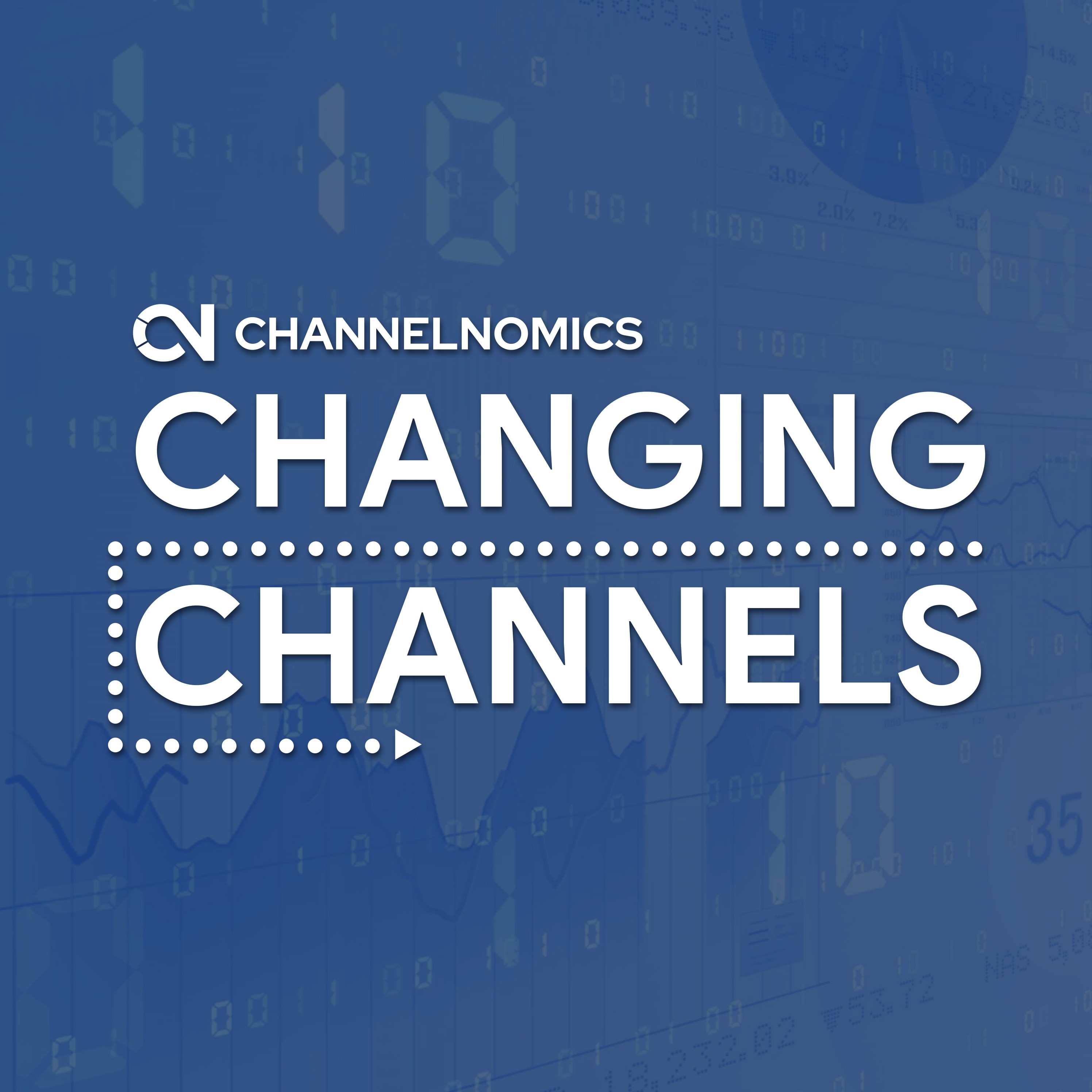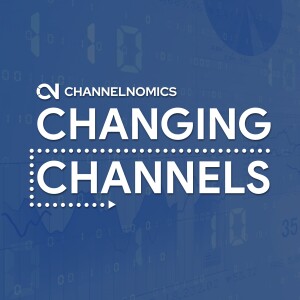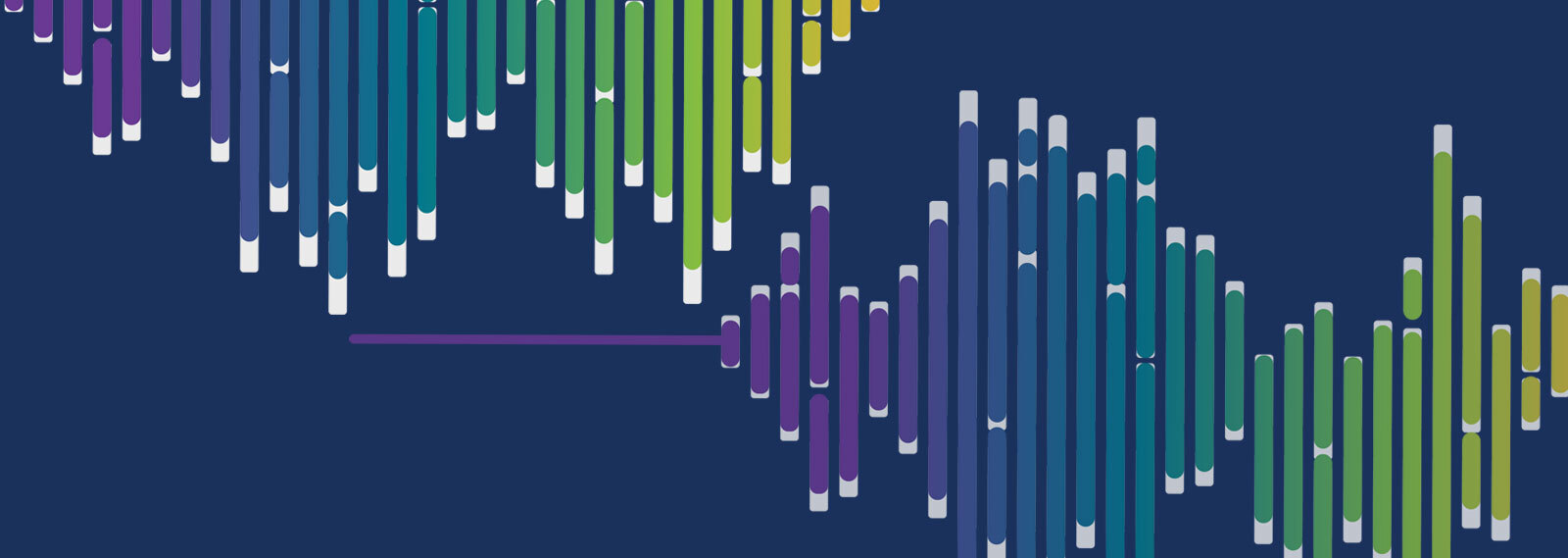
7.7K
Downloads
172
Episodes
Changing Channels uncovers what it takes to get the next generation of technology to market. Join Larry Walsh, chief analyst and CEO of Channelnomics, for candid conversations with thought leaders, channel chiefs, and partner executives sharing actionable insights, best practices, and lessons learned in a channel that’s constantly changing. Each episode provides expert go-to-market guidance for enhanced performance in the channel.
Changing Channels uncovers what it takes to get the next generation of technology to market. Join Larry Walsh, chief analyst and CEO of Channelnomics, for candid conversations with thought leaders, channel chiefs, and partner executives sharing actionable insights, best practices, and lessons learned in a channel that’s constantly changing. Each episode provides expert go-to-market guidance for enhanced performance in the channel.
Episodes

Tuesday Apr 15, 2025
How Plugable is Dealing with Tariff Turbulence
Tuesday Apr 15, 2025
Tuesday Apr 15, 2025
Tariffs are top of mind across the channel. In this episode of Changing Channels, Larry Walsh talks with Lynn Smurthwaite-Murphy, CEO of Pluggable Technologies, about the wide-reaching effects of shifting U.S. trade policy. Lynn shares how Pluggable restructured its supply chain in response to Trump-era tariffs and how new rounds of uncertainty are forcing fast, complex decisions. The discussion covers pricing volatility, the limits of reshoring, and how to stay competitive in a crowded peripherals market. With decades of channel experience, Lynn provides practical insight on managing through disruption and maintaining strategic focus when the rules keep changing.
Follow us, Like us, and Subscribe!
• Channelnomics: https://channelnomics.com/
• LinkedIn: https://bit.ly/2NC6Vli
• X (formerly Twitter): / channelnomics
About Larry Walsh:
• LinkedIn: / lmwalsh2112
• X (formerly Twitter): / lmwalsh_cn
• Bio: https://channelnomics.com/team/larry-...
About Lynn Smurthwaite-Murphy
• LinkedIn: https://www.linkedin.com/in/lynn-smurthwaite-murphy-icd-d-6454856/
Changing Channels is a production of Channelnomics, a brand of 2112 Enterprises LLC
Follow @Channelnomics to stay current on the latest #research, #bestpractices, and #resources. At @Channelnomics — the voice of thought leadership — we define #channel trends, chart new #GTM strategies, and #partner with industry leaders to champion #diversity in the channel.
© 2112 Enterprises LLC

Tuesday Mar 11, 2025
Delighting and Frustrating Partners
Tuesday Mar 11, 2025
Tuesday Mar 11, 2025
Vendors go to great lengths to create channel programs that enable and encourage partners to succeed in their mutual go-to-market activities. These programs define the rules and agreements under which vendors and partners operate. However, partners often have little direct influence over how these programs are crafted or managed. Vendors can either elevate partners to new heights or dash their hopes and aspirations. Channelnomics reviewed years of commentary from satisfaction surveys that gathered insights from thousands of partners on their experiences and perceptions of working with different vendors. We aggregated and compiled these comments, identifying the actions that delight and frustrate partners. In this special episode of Changing Channels, host Larry Walsh explores the highs and lows of vendor engagements with partners – and what channel leaders can learn from them. Don't forget to like, comment, and subscribe for more episodes of Changing Channels. Follow us, Like us, and Subscribe! • Channelnomics: https://channelnomics.com/ • LinkedIn: https://bit.ly/2NC6Vli • X (formerly Twitter): / channelnomics About Larry Walsh: • LinkedIn: / lmwalsh2112 • X (formerly Twitter): / lmwalsh_cn • Bio: https://channelnomics.com/team/larry-... Changing Channels is a production of Channelnomics, a brand of 2112 Enterprises LLC Follow @Channelnomics to stay current on the latest #research, #bestpractices, and #resources. At @Channelnomics — the voice of thought leadership — we define #channel trends, chart new #GTM strategies, and #partner with industry leaders to champion #diversity in the channel. © 2112 Enterprises LLC

Tuesday Nov 05, 2024
Esprinet CEO Alessandro Cattani on the Changing Face of European Distribution
Tuesday Nov 05, 2024
Tuesday Nov 05, 2024
In this episode of Changing Channels, host Larry Walsh speaks with Alessandro (Alex) Cattani, CEO of Esprinet Group, about the unique dynamics of working within the IT channel and distribution landscape across Europe. Unlike the United States, the European market is complex, shaped by distinct local economies, languages, and regulations across different countries. Cattani shares insights into how these regional distinctions require a highly localized approach, making distribution essential for navigating each country’s specific business climate.
The conversation explores the evolving state of distribution in Europe, highlighting the digital transformation reshaping distribution and the ongoing consolidation trend. As Cattani notes, while American distributors and global firms expand their footprint, smaller, regionally-focused distributors still play a critical role in servicing localized needs. This episode is an essential listen for anyone looking to understand the nuances of the European IT channel and how distribution strategies differ significantly from the American model. Tune in for expert insights on adapting to Europe’s fragmented market and the critical role that nimble, localized distribution partners play in supporting vendors’ success.
Don't forget to like, comment, and subscribe for more episodes of Changing Channels.
Follow us, Like us, and Subscribe!
• Channelnomics: https://channelnomics.com/
• LinkedIn: https://bit.ly/2NC6Vli
• X (formerly Twitter): / channelnomics
About Larry Walsh:
• LinkedIn: / lmwalsh2112
• X (formerly Twitter): / lmwalsh_cn
• Bio: https://channelnomics.com/team/larry-...
About Alessandro Cattani
• LinkedIn: https://www.linkedin.com/in/acattani/
Changing Channels is a production of Channelnomics, a brand of 2112 Enterprises LLC
Follow @Channelnomics to stay current on the latest #research, #bestpractices, and #resources. At @Channelnomics — the voice of thought leadership — we define #channel trends, chart new #GTM strategies, and #partner with industry leaders to champion #diversity in the channel.
© 2112 Enterprises LLC

Tuesday Oct 08, 2024
Exploring the Importance of Collaboration in Ecosystems
Tuesday Oct 08, 2024
Tuesday Oct 08, 2024
In this episode of Changing Channels, Channelnomics's Larry Walsh speaks with Stephanie Chiras, Senior Vice President of Partner Ecosystem Success at Red Hat, to discuss the critical role collaboration plays in building and leveraging successful ecosystem channels. Chiras highlights how no single company can solve all customer challenges alone, emphasizing the need for multiple partners to work together to deliver comprehensive solutions. Red Hat, as a leader in open-source software, has embraced this collaborative approach by creating a flexible, modular partner framework that enables partners to engage more effectively with both Red Hat and each other. Throughout the conversation, Chiras explains how collaboration is essential for driving value through AI, hybrid cloud, and other emerging technologies, and how Red Hat is evolving its partner program to foster these collaborative motions.
Don't forget to like, comment, and subscribe for more episodes of Changing Channels.
Follow us, Like us, and Subscribe!
• Channelnomics: https://channelnomics.com/
• LinkedIn: https://bit.ly/2NC6Vli
• X (formerly Twitter): https://twitter.com/Channelnomics
About Larry Walsh:
• LinkedIn: https://www.linkedin.com/in/lmwalsh2112/
• X (formerly Twitter): https://twitter.com/lmwalsh_CN
• Bio: https://channelnomics.com/team/larry-walsh/
About Stephanie Chiras
• LinkedIn: https://www.linkedin.com/in/stefanie-chiras-9022144/
Changing Channels is a production of Channelnomics, a brand of 2112 Enterprises LLC
Follow @Channelnomics to stay current on the latest #research, #bestpractices, and #resources. At @Channelnomics — the voice of thought leadership — we define #channel trends, chart new #GTM strategies, and #partner with industry leaders to champion #diversity in the channel.
© 2112 Enterprises LLC

Tuesday Sep 17, 2024
Inside NinjaOne's Meteoric Rise in Managed Services
Tuesday Sep 17, 2024
Tuesday Sep 17, 2024
In this episode of Changing Channels, host Larry Walsh speaks with Sal Sferlazza, the CEO and founder of NinjaOne, a leading managed services platform, to discuss the evolving landscape of Managed Services Providers (MSPs). They dive into how NinjaOne has emerged as a competitive alternative in the crowded MSP market by focusing on simplicity, scalability, and superior customer service. From the rise of MSPs to the challenges they face in today’s complex and commoditized environment, this conversation covers how vendors like NinjaOne are helping MSPs consolidate their tech stacks, improve business outcomes, and grow their customer bases. Sferlazza also shares insights on future trends, including the role of AI and the ongoing transformation of the managed services industry. Tune in to hear about NinjaOne’s journey, strategy, and the broader managed services ecosystem.
Don't forget to like, comment, and subscribe for more episodes of Changing Channels.
Follow us, Like us, and Subscribe!
• Channelnomics: https://channelnomics.com/
• LinkedIn: https://bit.ly/2NC6Vli
• X (formerly Twitter): https://twitter.com/Channelnomics
About Larry Walsh:
• LinkedIn: https://www.linkedin.com/in/lmwalsh2112/
• X (formerly Twitter): https://twitter.com/lmwalsh_CN
• Bio: https://channelnomics.com/team/larry-walsh/
About Sal Sferlazza
• LinkedIn: https://www.linkedin.com/in/sal-sferlazza-64b916/
About NinjaOne: https://www.ninjaone.com/about-us/
Changing Channels is a production of Channelnomics, a brand of 2112 Enterprises LLC
Follow @Channelnomics to stay current on the latest #research, #bestpractices, and #resources. At @Channelnomics — the voice of thought leadership — we define #channel trends, chart new #GTM strategies, and #partner with industry leaders to champion #diversity in the channel.
© 2112 Enterprises LLC

Tuesday Aug 20, 2024
Inside the Influencing Power of Partner Advisory Boards
Tuesday Aug 20, 2024
Tuesday Aug 20, 2024
Partner advisory boards (PABs) or councils (PACs) are integral components of many vendor channel programs, serving as crucial platforms for direct and candid dialogue between vendor leadership, channel managers, and partners. These forums allow vendors to gain valuable insights into their current operations and gauge partner sentiment regarding future plans and aspirations. While most vendors acknowledge the significance of PABs in their partner programs, the effectiveness of these forums can vary. Inconsistent execution or a lack of actionable feedback can diminish their value. Successful PABs require careful planning, coordination, active listening, and, most importantly, a genuine commitment from vendors to foster an environment where partners feel encouraged to engage meaningfully. Ivanti, a provider of security and IT management software, exemplifies the impact of a well-executed PAB. Through its robust advisory board, Ivanti gathers crucial insights and direction directly from its partners. In this episode of Changing Channels, Michelle Hodges, Senior Vice President of Global Channels and Alliances, shares her expertise on what it takes to successfully produce and leverage partner advisory boards for mutual benefit.
Check out Channelnomics’s Partner Advisory Board support resources:
- PAB Management & Support Services: https://channelnomics.com/pab/
- Partner Advisory Boards: A User Manual: https://channelnomics.com/partner-advisory-boards-a-vendor-user-manual/
- Choosing the Right Feedback Event: https://channelnomics.com/choosing-the-right-event/
Follow us, Like us, and Subscribe!
Channelnomics: https://channelnomics.com/
LinkedIn: https://bit.ly/2NC6Vli
X (formerly Twitter): https://twitter.com/Channelnomics
About Larry Walsh:
LinkedIn: https://www.linkedin.com/in/lmwalsh2112/
X (formerly Twitter): https://twitter.com/lmwalsh_CN
Official Bio: https://channelnomics.com/team/larry-walsh/
About Michelle Hodges
LinkedIn: https://www.linkedin.com/in/michellewhodges/
Changing Channels is a production of Channelnomics, a brand of 2112 Enterprises LLC
Follow @Channelnomics to stay current on the latest #research, #bestpractices, and #resources. At @Channelnomics — the voice of thought leadership — we define #channel trends, chart new #GTM strategies, and #partner with industry leaders to champion #diversity in the channel.
© 2112 Enterprises LLC

Tuesday Aug 06, 2024
Building Annual Recurring Revenue with Partners
Tuesday Aug 06, 2024
Tuesday Aug 06, 2024
More than 90% of software and services vendors are selling their products on subscription plans, generating annual recurring revenue (ARR). The model is more advantageous than traditional sales through transactional perpetual licensing, as it provides predictable revenue that leads to higher market valuations. While software and services sold on long-term recurring contracts have many operational and economic advantages, generating sales through partners isn’t always easy. Many vendors are challenged in getting partners to accept and act on the model. A company finding success in the subscription model is Cato Networks, which recently announced it surpassed $200 million in ARR, doubling the volume in less than two years. Cato’s global channel chief, Frank Rauch – a veteran of legacy and emerging channel models – joins Changing Channels to discuss the lessons learned in developing ARR through partners.
Follow us, Like us, and Subscribe!
Channelnomics: https://channelnomics.com/
LinkedIn: https://bit.ly/2NC6Vli
X (formerly Twitter): https://twitter.com/Channelnomics
About Larry Walsh:
LinkedIn: https://www.linkedin.com/in/lmwalsh2112/
X (formerly Twitter): https://twitter.com/lmwalsh_CN
Official Bio: https://channelnomics.com/team/larry-walsh/
About Frank Rauch
LinkedIn: https://www.linkedin.com/in/frankrauch/
Changing Channels is a production of Channelnomics, a brand of 2112 Enterprises LLC
Follow @Channelnomics to stay current on the latest #research, #bestpractices, and #resources. At @Channelnomics — the voice of thought leadership — we define #channel trends, chart new #GTM strategies, and #partner with industry leaders to champion #diversity in the channel.
© 2112 Enterprises LLC

Tuesday Jul 23, 2024
Redefining Managed Services Economics
Tuesday Jul 23, 2024
Tuesday Jul 23, 2024
The managed services segment of the channel has long operated on a “best of breed” basis. These companies developed services with collections of technologies from multiple vendors, providing what they considered the best options for their needs. While "best of breed" is considered a good means of developing effective systems, it is not always easy and often expensive to create and maintain. The holy grail of managed services is the simplification of systems into consolidated applications with well-integrated features and lower total cost of ownership. This approach, in theory, leads to better organizational management, predictable costs, and improved service delivery to end customers.
Earlier this year, Kaseya rolled out Kaseya 365, a new package that provides MSPs with the tools they need for service delivery at a single, low subscription price. Kaseya believes this model, which it has been working on for years, will redefine managed services economics. Mike DePalma, the vice president of business development, joins Changing Channels to discuss the new Kaseya model, what it means for the managed services community, and where the MSP model is going next.
Follow us, Like us, and Subscribe!
Channelnomics: https://channelnomics.com/
LinkedIn: https://bit.ly/2NC6Vli
X (formerly Twitter): https://twitter.com/Channelnomics
About Larry Walsh:
- LinkedIn: https://www.linkedin.com/in/lmwalsh2112/
- X (formerly Twitter): https://twitter.com/lmwalsh_CN
- Official Bio: https://channelnomics.com/team/larry-walsh/
About Mike DePalma
- LinkedIn: https://www.linkedin.com/in/michaeldepalma1/
Changing Channels is a production of Channelnomics, a brand of 2112 Enterprises LLC
Follow @Channelnomics to stay current on the latest #research, #bestpractices, and #resources. At @Channelnomics — the voice of thought leadership — we define #channel trends, chart new #GTM strategies, and #partner with industry leaders to champion #diversity in the channel.
© 2112 Enterprises LLC

Tuesday Jul 09, 2024
What Channel Women Face in their Careers
Tuesday Jul 09, 2024
Tuesday Jul 09, 2024
Women in the IT channel face unique career challenges. These include skill development, gaining experience, and demonstrating their value for advancement in a predominantly male industry while also balancing motherhood and family responsibilities. Simply put, men don’t face the same pressures as women.
Progress is evident, though, with more women holding leadership positions and rising through the ranks. However, mid-level channel professionals continue to face challenges balancing work and family commitments.
In this episode of Changing Channels, Bryn Nettesheim, explores career issues for women building successful careers in the channel with an expert panel of senior women channel leaders:
• Meaghan Sullivan-Moore, VP of Global Partner Marketing, ServiceNow
• Chari Rhoades, VP of Americas Channel and Partner Sales, Proofpoint
• Heather K. Margolis, CEO and Founder, Channel Maven
Our discussion provides insights, experiences and tips for how women in the channel can balance their career and home commitments.
Follow us, Like us, and Subscribe!
Channelnomics: https://channelnomics.com/
LinkedIn: https://bit.ly/2NC6Vli
X (formerly Twitter): https://twitter.com/Channelnomics
About Bryn Nettesheim:
• LinkedIn: https://www.linkedin.com/in/brynnettesheim/
About Our Guests
• Heather K. Margolis, Channel Maven: https://www.linkedin.com/in/heatherkmargolis/
• Meaghan Sullivan-Moore, ServiceNow: https://www.linkedin.com/in/meaghansullivan-moore/
• Chari Rhoades, Proofpoint: https://www.linkedin.com/in/chari-rhoades-21615a8/
Changing Channels is a production of Channelnomics, a brand of 2112 Enterprises LLC
Follow @Channelnomics to stay current on the latest #research, #bestpractices, and #resources. At @Channelnomics — the voice of thought leadership — we define #channel trends, chart new #GTM strategies, and #partner with industry leaders to champion #diversity in the channel.
© 2112 Enterprises LLC

Tuesday Jun 25, 2024
Connecting the Ecosystem Dots with ISVs
Tuesday Jun 25, 2024
Tuesday Jun 25, 2024
No one technology vendor has all the products and services that businesses need to operate efficiently and effectively. Even the best vendors with the broadest portfolios have limitations. They need to partner with complementary products and services to extend the value of their applications. This need is at the heart of what makes ecosystems valuable. Through ecosystems vendors and partners are able to combine products into systems. A significant part of this ecosystem is independent software vendors (ISVs), which make the applications that extend the functionality and value of the underlying technology products and platforms. The challenge vendors and partners face is identifying and forming relationships with the right ISVs. In this special episode of Changing Channels, host Larry Walsh speaks with three industry experts – John Dusett of Ingram Micro, Alyssa Fitzpatrick of Elastic, and Alex Lewis of Genesys – about what it takes to create value-generating relationships with ISVs.
Follow us, Like us, and Subscribe!
Channelnomics: https://channelnomics.com/
LinkedIn: https://bit.ly/2NC6Vli
X (formerly Twitter): https://twitter.com/Channelnomics
About Larry Walsh:
- LinkedIn: https://www.linkedin.com/in/lmwalsh2112/
- X (formerly Twitter): https://twitter.com/lmwalsh_CN
- Official Bio: https://channelnomics.com/team/larry-walsh/
About Our Guest
- John Dusett, Ingram Micro: https://www.linkedin.com/in/johndusett/
- Alyssa Fitzpatrick, Elastic: https://www.linkedin.com/in/alysfitz/
- Alex Lewis, Genesys: https://www.linkedin.com/in/alexlewis/
Changing Channels is a production of Channelnomics, a brand of 2112 Enterprises LLC
Follow @Channelnomics to stay current on the latest #research, #bestpractices, and #resources. At @Channelnomics — the voice of thought leadership — we define #channel trends, chart new #GTM strategies, and #partner with industry leaders to champion #diversity in the channel.
© 2112 Enterprises LLC
